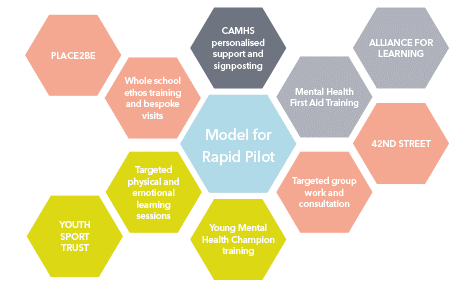Improving young people's mental health through our schools

The Greater Manchester Health and Social Care Partnership-commissioned Mentally Healthy Schools pilot is showing positive results demonstrating that schools are a good environment to influence health behaviours and improve young people’s mental health and wellbeing. Dr Sandeep Ranote, consultant child and adolescent psychiatrist and medical director at North West Boroughs as well as children’s mental health lead for Greater Manchester, summarises the findings.
The Mentally Healthy Schools pilot was commissioned by the partnership to explore new ways of preventing mental health issues in young people through school-based interventions. The programme brought together the NHS and partners from the voluntary, community and social enterprise sector with the aim to explore how their evidence-based approaches could create a whole school approach to improving young people’s mental health through developing their physical and emotional literacy and by providing the right training, support and resources for an adult and young person workforce.
We know from evidence that children and young people are experiencing a decline in their physical and emotional wellbeing as well as an increase in mental health issues. This is particularly the case when facing exam-related stress, the prospect of lack of paid employment or further education and the impact of social media and inactivity. Physical activity and good mental health are linked, as are higher levels of academic achievement and overall wellbeing. Paradoxically, at a time when young people have so much to gain from being physically active, their participation levels are likely to be lower and their stress and anxiety higher.
It is well documented that schools are a great environment to influence positive health behaviours and are often the front-line in support for mental health issues. With the release of the Transforming children and young people’s mental health green paper, there is a call for clinical commissioning groups, children and adolescent mental health services (CAMHS), and local authorities to consider unique approaches and commissioning to make change happen as well as how schools can be better supported and used to get to the young people that need support the most. With the decline in young people’s physical, social and emotional wellbeing there has never been a more important time for taking action through an approach such as the Mentally Healthy Schools pilot.
The approach
The pilot was delivered by a consortium of five partners: programme is a collaboration between the Youth Sport Trust, Alliance for Learning Teaching School, 42nd Street and Place2Be and Manchester Foundation Trust’s CAMHS service. It offered a complete package of support to 31 schools across Greater Manchester recruited by Alliance for Learning. There was a whole school, workforce, peer mentor and young people approach while also considering both their physical and emotional wellbeing as outlined in Future in mind. The pilot has created a network of schools that were provided with and supported to deliver the following:

Key findings
School leaders reported increased confidence in dealing with students with mental health problems, improved knowledge about how to refer students to specialised services, and increased awareness about the importance of staff health and wellbeing.
Year 5 primary school students reported improved confidence, skills and knowledge of mental and physical health. Due to the rapid nature of the pilot it was difficult to fully assess the impact of the programme on wellbeing outcomes. However, there were some indicative signs the programme was impacting on physical wellbeing with a reported increase in activity levels.
Young mental health champions reported feeling proud and happy about being chosen and enjoyed the training. They felt empowered and optimistic they could make a difference in their schools.
Year 10 secondary school students reported enjoying learning about mental and physical health, the discussions on stress management and meeting the athlete mentors. Students reported feeling more confident and discussed many skills which they had learned from the workshops provided.
Middle school leaders reported enjoying the training and improved attitudes towards mental health.
Conclusions
Schools are places of education and have limited capacity or resources to deal with the evident decline in pupil wellbeing and mental health, therefore they value the additional support and access to expertise and programmes. This approach gives school leaders time to think, to understand and to take action with the added value of inspirational training and innovative approaches to engaging young people. It also places a huge value on mobilising young people as mentors, activists and influencers. It places the voice of young people at the heart of what schools provide to improve the physical and emotional wellbeing of young people and allows them to create a positive ethos of wellbeing across the whole school. It is evident that this type of partnership approach is an effective mechanism for longer-term change. This approach also addresses mental health issues arising from low level stress and anxiety which can, undetected, manifest themselves as mental health issues in later life.
There is much to be learnt from the pilot that provides a holistic approach to many of the challenges laid out in the Transforming children and young people's mental health green paper. While the objectives of the green paper will help address the shortfall in services and getting the right support to the right young people, the pilot has demonstrated that a more sustainable and transformative approach can improve outcomes from young people in the longer term.
Next steps
The pilot outcomes were taken to the Greater Manchester Health and Care Board in November as part of the partnership’s commitment to co-production of new services. Young people talked about the link between physical and mental health, emphasising the importance of arts and drama activities alongside traditional physical activities. The pilot is now being extended to an additional 29 schools and two further education colleges with an ambitionto extend to 125 schools and colleges by September 2019.
Dr Sandeep Ranote is consultant child and adolescent psychiatrist and medical director at North West Boroughs Healthcare as well as children’s mental health lead for Greater Manchester Health and Social Care Partnership. You can follow Greater Manchester Health and Social Care Partnership on Twitter at @GM_HSC and Dr Sandeep Ranote at @DrSRanote



